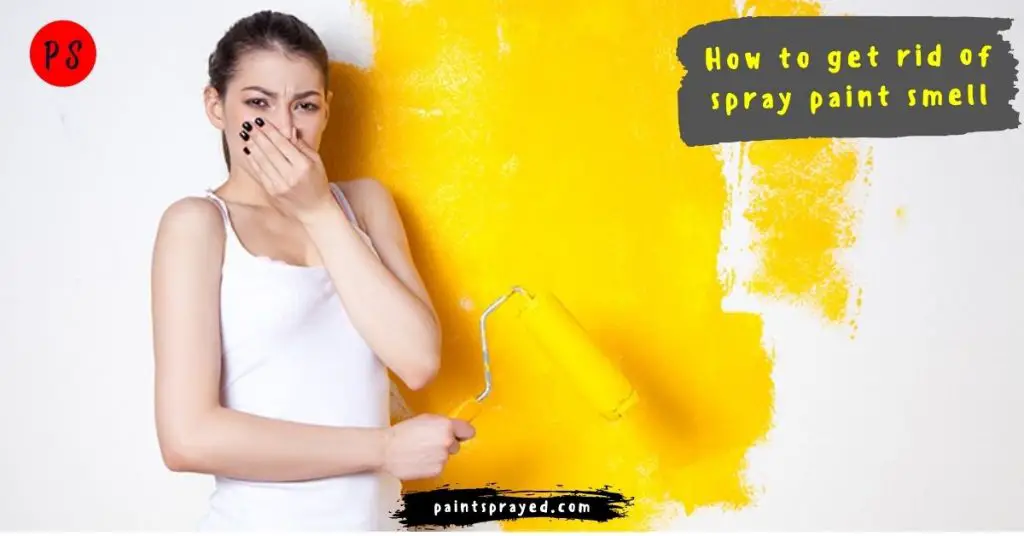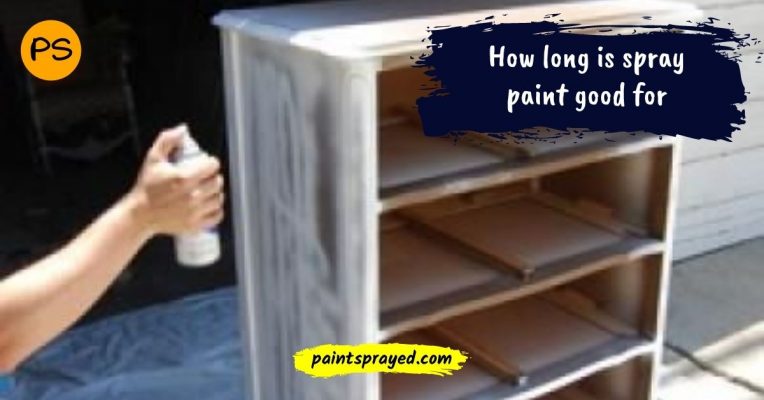Today I have come up with the solutions to get rid of the spray paint smell from your clothes.
While a fresh coat of paint can help your home smell new, clean, and all sorts of pleasant things, spray painting isn’t just for the walls.
Spray paints can be used on smaller elements in the house that need more than just a coat of paint like cabinet handles and door frames, or on large projects such as a mural Wall!
The fumes can be problematic though… That’s why we review the dangers that aerosol paints release in this article!
Here is the complete guide on how to get rid of the spray paint smell. Professionals will also get benefit from this post of mine because I have also shared my experience with you guys.
We’ll also look into DIY ways to remove the odors that spray paint leaves behind, as well as suggest some great preventative measures you can take to avoid nasal assaults in the first place.
How long does spray paint smell last?
Does spray paints harm and are they poisonous?
While using spray paint instead of regular paint from a brush almost always makes painting projects go by more quickly and smoothly.
The primary drawback to spraying can be just how vile the fumes usually are.
In fact, some spray paints include harmful chemicals like VOCs (volatile organic compounds) and other toxic fumes that linger in your home for hours or days after you’ve used them.
What will happen to you if you breathe these paint fumes?
If you’ve ever been around spray paint, chances are that you know how its fumes can affect your health.
The vapors released from such cans are dangerous. They can sicken you in many ways.
But we don’t want to go into too much detail here because chances are that you already know it would be better for your health.
if you were to avoid prolonged exposure and contact with them for reasons of self-preservation.
Most people, in most cases, experience a variety of short-term health effects from the misuse of spray paint.
For example, some people may experience a painful rash or skin condition because they are allergic to spray paint fumes.
There are other risks involved with inhaling toxic fumes from spray cans as well.
Some of the more serious long-term outcomes include but are not limited to cancer and brain damage, liver failure, and kidney damage.
How long does spray paint smell last?
The smell of paint can usually be abated within a day and after 2-3 days it goes completely, but if it lingers at all, it will likely remain for some time.
This is because there are certain ways in which paint mixes with other elements in your home.
As a result, the odor isn’t coming from those paints you purchased but rather the particles which have fitted into other areas or are otherwise lingering on the surface you painted.
Many people find they can diminish this smell simply by keeping their room well-ventilated during and after painting.
Though that’s not to say it will disappear overnight as so many people believe!
While putting up scented candles or burning essential oils might seem like good ideas.
These methods will simply serve to mask the smell, an important aesthetic goal we hope to achieve here!
How the paint smell can go naturally?
While you should always seek professional assistance if your ambient space suffers from spray paint fumes.
Most household spray can fume are easily curbed through natural solutions which involve products you probably already have laying around.
You would be impressed at some of the unorthodox ways that people use to eliminate their spray paint fume problems by using dryer sheets.
To blowing out candles and leaving the ivory tower window open.
The best tip we can offer is to go ahead and try out a few methods but do so with caution because it’s important to protect yourself by wearing protective gear.
So as not to damage your lungs and expose your body to harmful chemicals in the solvents in all painted aerosols.
How to use Baking soda to get rid of the paint smell?
You can use baking soda to get rid of the paint spray smell. Baking soda or baking powder is an alkaline agent which is useful to remove different smells.
To remove the paint spray smell from your clothes, pour a cup of baking soda, scrub it on your clothes and then wash it with warm water.
The paint spray smell will go off. In the same way, you can use baking soda to remove the paint spray smell from your hands.
Just take some water and add a pinch of baking soda to it. Then wash your hands with this water.
How to use onions to get rid of the paint smell?
Onions are a great way to get rid of the smell of spray paint (and other unpleasant smells). The method is simple but perfect.
All you need to do is to cut the onion in half, cut a slit into the onion, and then rub it on the surface that is sprayed with paint. The onion will absorb the paint and the smell.
How to use charcoal to get rid of the paint smell?
First, you need to take the charcoal and put it in the bucket. Then you need to add vinegar to it and stir it for some time.
Then you need to cover the lid tightly so that it can absorb all the smell. If you want to get rid of the smell then you need to store it for more than a week.
After that, you can wash it with water, and then it will become clean.
How to get rid of the paint smell using Lemon Water?
Paint smells are usually from solvents that are used in manufacturing paints. The paint smell sticks to surfaces and is difficult to remove.
To remove the smell, you need to use an odor absorber.
Lemon water is a natural odor absorber. It has a high oxygen content and acts as a disinfectant and anti-bacterial agent. It is acidic in nature and can blemish certain surfaces.
Mix a few drops of pure lemon juice or lemon essential oil with water and pour into a spray bottle.
If you have some diluted lemon juice in your fridge, use that. Spray the paint-smell areas with this solution. Let it stand for 5 minutes and wipe off.
How to remove the smell of paint with the help of vinegar?
Vinegar can be used to remove the smell of spray paint. Spray paint leaves behind a strong chemical smell.
The smell can be removed by washing away the paint using a chemical. Vinegar works as a natural cleaner. You can use it to remove the smell of spray paint from different surfaces.
How to remove the smell of paint with coffee grounds?
I have tried this out and it’s true. Coffee grounds are great at absorbing smells, and paint is no exception.
I have many art supplies in my room and I also go to a lot of art museums, so my walls are often smelling of paint.
On one occasion, when I came back home, the smell was so strong, that it was like a paint bomb had just gone off in my bedroom.
Fortunately, I had some coffee grounds that I had used to brew some coffee earlier that day, so I spread the grounds all over my room, and put a box of them in the corner.
After a few days, the smell of paint was completely gone.
How to protect the house from fumes?
We initially should focus on protecting our house from smells and fumes getting in the corners. It is better to protect and try to prevent these fumes from occurring in the first place.
It’s a valid concern that you guys have there as paint fume from spray paints is quite harmful to our health and sometimes even to our pets.
Here are some steps we can take in order to minimize/prevent paint fume:
- Use high-quality paints. Cheap paints usually have good quality. But the thing is, cheap paints have chemicals that cause severe headaches and nausea. So, if you are using cheap paints, it’s better to buy a fan and use it in your work area. Just don’t forget to use a mask.
- While you are spraying, open windows and doors to let the fumes go outside. This will help you stay away from fumes and pollutants.
- If you are working indoors and are doing spray painting jobs for a long time, use an air filter mask.
- If there is an exhaust fan in your work area, turn it on.
- If need be, use a respirator for protection. This is the most important thing.
- If you are working outside, use a mask. If you are working inside, open windows and doors so that the air can flow.

Some more tips to save you from paint smell:
If you’ve already purchased an oil-based spray paint, make sure it’s a low or zero-VOC formula. This will benefit your overall health and reduce the risks associated with air pollutants.
If you are concerned about the environmental impact of choosing these paints, look for an eco-friendly option that’s made from organic materials such as plants and clay.
Another way to prevent lingering spray-paint fumes is to check the weather forecast before you begin painting.
It may seem like a strange thing to do, but how humid a day is will have a big impact on the amount of paint odor that sticks around after you’re done spray painting.
The less humid the day, the quicker your paint will dry and the less odor it’s likely to contain.
When in doubt about whether or not it’s a good day for painting, try and avoid days with high humidity.
It’s important to know how to reduce the number of hazardous materials that are going into the atmosphere when painting a room.
For example, making sure each layer of paint has dried overnight before applying another coat is one way that you can help minimize the effects of airborne chemical splatters.
If you’re using spray paint to cover your furniture or other decoration in your home, ventilation is the key. Open up all of the windows in your house so that fumes can dissipate into the air.
Don’t open all the windows if you don’t want your home to become drafty or uncomfortable, but opening a few should do the trick!
Also, keep everyone and everything out of the area that’s in need of a makeover since fumes can spread quickly and cause harm if inhaled by people and pets alike.
Considering the level of sensitivity that spray paint fumes may have on your home and family, you may want to invest in an air purifier or system.
They are specifically designed to deal with noxious chemicals and odors, both of which one can encounter while using spray paint.
So to keep those pollutants out of your space, these systems work by removing and neutralizing the spray paint fumes.
Is it a safe practice to paint indoors?
The best way to prevent sprays and paints from causing air-borne fumes is to make sure that you are doing these things in the right place.
You shouldn’t be doing any type of spray painting indoors. You can even use a different type of paint for example your garage.
Sometimes people get so caught up in trying to keep everything white that they don’t realize that this isn’t a good idea.
Necause the paints will release fumes and other unhealthy chemicals into their walls, cabinets, etc. It is better to be safe than sorry.
The fumes will be dispersed outside, which means there won’t be any bad smell. Additionally.
If you don’t have a yard, the best spot to paint should be on your doorstep or on a balcony area like ours where the fumes can be easily ventilated with fresh air.
Will spray paint smell go away?
Yes, the smell of spray paint will eventually go away over time.
The length of time it takes for the smell to completely dissipate will depend on a few factors, including the type of paint you used.
The ventilation in the area where the paint was applied, and the temperature and humidity of the environment.
In general, the smell of spray paint will be strongest immediately after the paint is applied and will begin to fade within a few hours.
The smell may be more noticeable in a poorly ventilated area or in a hot, humid environment. In these conditions, it may take longer for the smell to dissipate.
To help the smell of spray paint dissipate more quickly, you can try increasing ventilation in the area where the paint was applied.
This can be done by opening windows, using fans, or running an air purifier.
You can also try using an air freshener or other odor-eliminating product to help mask the smell until it dissipates on its own.
Is spray paint smell harmful?
Inhaling the fumes from spray paint can be harmful to your health.
The fumes from spray paint contain a number of potentially toxic chemicals, including volatile organic compounds (VOCs) and solvents.
These chemicals can cause a range of symptoms, including headache, dizziness, and nausea, as well as more serious health problems such as respiratory and neurological issues.
Prolonged exposure to the fumes from spray paint can also be harmful to your respiratory system and may lead to more serious health problems.
It is important to use spray paint in a well-ventilated area and to follow the safety precautions listed on the product label.
If you experience any symptoms after using spray paint, it is important to seek medical attention.
How long are spray paint fumes harmful?
The length of time that spray paint fumes are harmful depends on a number of factors, including the type of paint being used.
The amount of paint being used, and the ventilation in the area where the paint is being used.
In general, it is best to assume that the fumes from spray paint will be harmful until they have completely dissipated.
In a well-ventilated area, the fumes from spray paint should dissipate relatively quickly. However, if the area is poorly ventilated, the fumes can linger for a longer period of time.
It is important to use spray paint in a well-ventilated area to minimize the risk of inhaling harmful fumes.
If you are concerned about the fumes from spray paint, it is a good idea to open windows and doors and use fans to help dissipate the fumes.
How do you get rid of spray paint smell?
You can get rid of spray paint smell by:
- Ventilating the area: Open windows and doors to allow fresh air to circulate.
- Using odor absorbers: Place bowls of vinegar, coffee grounds, baking soda, or activated charcoal in the room to absorb the odor.
- Cleaning surfaces: Wipe down any surfaces that have been painted with a solution of water and dish soap to remove as much paint as possible and reduce the odor.
- Running air purifiers: Run air purifiers with HEPA filters to trap and remove paint particles and odors from the air.
- Using odor-neutralizing sprays: Spray an odor-neutralizing solution, such as Fabreeze, in the room to help neutralize the paint smell.
- Waiting: The smell will naturally dissipate over time, so giving it time and ventilation is also an option.
How long do spray paint fumes stay in the air?
The length of time that spray paint fumes stay in the air can vary depending on several factors, including the type of paint, the size of the area being painted, and the ventilation in the space.
In general, solvent-based spray paints (which contain volatile organic compounds or VOCs) tend to release fumes that can linger in the air for several hours or even days if the area is not well-ventilated.
On the other hand, water-based spray paints tend to release fewer fumes that dissipate more quickly.
It’s important to note that inhaling spray paint fumes can be harmful to your health.
So it’s recommended to use spray paint in a well-ventilated area and wear a mask to protect yourself from inhaling the fumes.
If possible, it’s best to paint outside or in a well-ventilated area with fans or open windows to help circulate the air and reduce the concentration of fumes.
How do you get rid of spray paint smell fast?
Getting rid of spray paint smell can be challenging, but there are several things you can do to help reduce the odor and dissipate it more quickly:
- Ventilate the area: Open windows and doors and turn on fans to increase air circulation and remove the fumes from the area. You can also use an exhaust fan or air purifier to help remove the smell more quickly.
- Use odor-absorbing materials: Place bowls of white vinegar or baking soda in the room to help absorb the fumes. You can also try using activated charcoal or odor-neutralizing sprays to help eliminate the smell.
- Clean surfaces: Wipe down any surfaces that may have come into contact with the spray paint, such as floors or furniture, with a mixture of warm water and mild soap. This can help remove any residual odor.
- Be patient: Spray paint fumes will dissipate over time on their own. It may take a few days for the smell to completely disappear, but with proper ventilation and cleaning, it should gradually become less noticeable.
It’s important to note that spray paint should always be used in a well-ventilated area, and it’s recommended to wear a mask or respirator to avoid inhaling the fumes.
Can you sleep in a room with spray paint fumes?
It is not recommended to sleep in a room with fresh spray paint fumes, as these fumes can be harmful to your health.
The solvents in spray paint can release volatile organic compounds (VOCs) into the air, which can irritate the eyes, nose, and throat, cause headaches, dizziness, and nausea, and in severe cases, lead to more serious health effects.
If you have just painted a room with spray paint, it is important to ventilate the room by opening windows or using fans to circulate the air.
You should also avoid sleeping in the room for at least a day or two, or until the fumes have dissipated.
To minimize the risk of exposure to spray paint fumes, it’s recommended to use a respirator or a mask with a particulate filter while applying spray paint, and to work in a well-ventilated area.
You should also follow the manufacturer’s instructions for the product, including any recommended safety precautions and ventilation requirements.
If you experience any symptoms of exposure to spray paint fumes, such as difficulty breathing, chest pain, or persistent headache, you should seek medical attention immediately.
Is spray paint toxic to breathe?
Spray paint can be toxic to breathe, especially if the fumes are inhaled in large amounts or over a prolonged period.
The solvents in spray paint can release volatile organic compounds (VOCs) into the air, which can irritate the eyes, nose, and throat, cause headaches, dizziness, and nausea, and in severe cases, lead to more serious health effects.
The toxicity of spray paint depends on the specific product, as different types of spray paint may contain different solvents and chemicals.
Some spray paints may also contain hazardous materials such as lead, cadmium, or other heavy metals, which can be toxic if inhaled or ingested.
To minimize the risk of exposure to spray paint fumes, it’s important to use spray paint in a well-ventilated area and to wear appropriate personal protective equipment, such as a respirator or a mask with a particulate filter.
It’s also important to follow the manufacturer’s instructions for the product, including any recommended safety precautions and ventilation requirements.
If you experience any symptoms of exposure to spray paint fumes, such as difficulty breathing, chest pain, or persistent headache, you should seek medical attention immediately.
What kills the smell of spray paint?
There are several things you can do to help get rid of the smell of spray paint:
- Ventilate the area: Open windows and doors and use fans to help circulate the air and dissipate the fumes.
- Use air purifiers: An air purifier can help remove the spray paint fumes from the air, especially if the area you are working in does not have good ventilation.
- Charcoal: Activated charcoal is a natural odor absorber that can help to remove the smell of spray paint. You can place a few pieces of activated charcoal in the room to help absorb the fumes.
- Baking soda: Baking soda is another natural odor absorber that can help to remove the smell of spray paint. You can sprinkle baking soda on the affected area and leave it for a few hours before vacuuming it up.
- Vinegar: Vinegar is a natural deodorizer that can help to neutralize the smell of spray paint. You can fill a bowl with vinegar and leave it in the room for a few hours to help absorb the fumes.
It’s important to note that these methods may help to reduce the smell of spray paint, but they may not completely eliminate it.
If you are sensitive to the smell of spray paint, it’s recommended to wear a mask or respirator while using spray paint.
And to work in a well-ventilated area to minimize the number of fumes you inhale.
How to Properly Ventilate and Protect Yourself When Using Spray Paint?
Spray painting can be a fun and creative activity, but it’s important to keep in mind that it can also be hazardous to your health if proper precautions aren’t taken.
In order to properly ventilate and protect yourself while using spray paint, there are a few things you should keep in mind.
- Choose a well-ventilated area: When spray painting, it’s important to choose a well-ventilated area. This means that the area you’re painting in should have plenty of fresh air circulating through it. If you’re painting indoors, make sure there’s good air flow by opening windows and doors. If you’re painting outdoors, make sure you’re not in a confined space and that you’re not spraying in windy conditions.
- Wear protective gear: It’s important to protect yourself when spray painting. Wear a respirator or mask that is designed for use with spray paint. This will help protect your lungs from inhaling paint fumes. Additionally, wear gloves and eye protection to prevent skin and eye irritation from the paint.
- Use a spray booth or DIY ventilation system: If you’re doing a lot of spray painting, consider using a spray booth or DIY ventilation system. A spray booth is a specially designed room that is used for painting. It has ventilation fans that pull the fumes out of the room, keeping the air clean. If you don’t have a spray booth, you can create your own ventilation system by using fans to circulate the air.
- Follow the manufacturer’s instructions: Always follow the manufacturer’s instructions when using spray paint. This includes using the paint in a well-ventilated area and wearing protective gear. If the manufacturer recommends using the paint outdoors only, make sure you do so.
- Clean up properly: Once you’re finished spray painting, make sure you clean up properly. This includes disposing of any used spray cans or containers properly. Never burn or puncture cans as they may explode or release toxic fumes.
In summary, when using spray paint, choose a well-ventilated area, wear protective gear, use a spray booth or DIY ventilation system if possible, follow the manufacturer’s instructions, and clean up properly.
By following these simple steps, you can protect yourself and others from the harmful effects of spray paint.
When Is It Safe to Enter a Room After Spray Painting?
After spray painting a room, it’s important to wait for the paint to dry and the fumes to dissipate before entering the room again.
The length of time you should wait can vary depending on a few factors.
- Type of paint: The type of paint you used can affect how long it takes for the fumes to dissipate. Some types of paint, such as oil-based paints, can take longer to dry and release fumes than water-based paints. Be sure to check the paint can or manufacturer’s instructions for specific drying times.
- Ventilation: The amount of ventilation in the room can also affect how long it takes for the fumes to dissipate. If you have good air flow in the room, it will help the fumes dissipate faster. You can speed up the process by opening windows and doors, using fans, or turning on an air purifier.
- Room size: The size of the room can also affect how long it takes for the fumes to dissipate. A larger room will naturally take longer for the fumes to dissipate compared to a smaller room.
In general, it’s a good idea to wait at least 24 hours before entering a freshly painted room.
However, this can vary depending on the factors listed above. You should also take into consideration any respiratory issues or sensitivities you may have to paint fumes.
If you need to enter the room before the recommended waiting time has passed, make sure you wear a respirator or mask that is designed for use with spray paint.
Additionally, keep the room well-ventilated by opening windows and doors, using fans, or turning on an air purifier.
In summary, the length of time you should wait before entering a freshly painted room can vary depending on the type of paint, ventilation, and room size.
In general, waiting at least 24 hours and ensuring good ventilation is a good rule of thumb to follow.
Remember to wear protective gear if you need to enter the room before the recommended waiting time has passed.
How to Safely Dispose of Spray Paint Cans?
Properly disposing of spray paint cans is important to ensure the safety of yourself and the environment. Here are some tips on how to safely dispose of spray paint cans:
- Check with your local waste management facility: Some areas have specific guidelines for how to dispose of spray paint cans. Check with your local waste management facility to see if they have any specific instructions or requirements.
- Use up as much paint as possible: Before disposing of a spray paint can, try to use up as much of the paint as possible. This will reduce the amount of leftover paint in the can, making it safer to dispose of.
- Empty cans are recyclable: Once the can is empty, it can be recycled with other metal cans. Make sure to remove the spray nozzle before recycling.
- Partially full cans should be treated as hazardous waste: If the can is partially full, it should be treated as hazardous waste. Contact your local hazardous waste facility for instructions on how to dispose of it properly.
- Don’t burn or puncture cans: Never burn or puncture spray paint cans, as they can explode or release toxic fumes. Instead, dispose of them in accordance with your local waste management guidelines.
In summary, to safely dispose of spray paint cans, try to use up as much paint as possible before disposing of the can.
Empty cans can be recycled with other metal cans, while partially full cans should be treated as hazardous waste and disposed of in accordance with your local guidelines.
Never burn or puncture spray paint cans, as this can be dangerous.
Does Activated Charcoal Really Work to Remove Spray Paint Odor?
Activated charcoal is often recommended as a natural solution to help remove spray paint odor from a room.
The idea is that the porous surface of the charcoal can absorb and trap the volatile organic compounds (VOCs) that are released from the spray paint, thus reducing the odor in the room.
Activated charcoal has been shown to be effective in absorbing odors in general, but its effectiveness at removing spray paint odor specifically is less clear.
While some people report success with using activated charcoal to remove spray paint odor, there is limited scientific evidence to support this claim.
In addition to using activated charcoal, it’s important to properly ventilate the room to help the fumes dissipate.
You can open windows and doors, use fans, or turn on an air purifier to help improve the air quality in the room.
If you’re looking for a natural solution to remove spray paint odor, activated charcoal is worth a try.
However, it’s important to remember that it may not be a miracle solution, and proper ventilation is still crucial for reducing spray paint fumes in a room.
If the odor persists or you experience any symptoms such as dizziness, headache, or nausea, it’s best to seek medical advice.
How to Improve Indoor Air Quality with Low VOC Spray Paint?
Indoor air quality is an important consideration when using spray paint, as some types of paint can release harmful volatile organic compounds (VOCs) into the air.
Choosing low VOC spray paint is one way to reduce the number of harmful chemicals released into the air.
But there are additional steps you can take to improve indoor air quality when using spray paint. Here are some tips:
- Choose low VOC spray paint: When shopping for spray paint, look for products that are labeled as low VOC or zero VOC. These products are formulated with fewer harmful chemicals, which can help improve indoor air quality.
- Use proper ventilation: Proper ventilation is important when using spray paint. Open windows and doors, use fans, or turn on an air purifier to improve air flow and help the fumes dissipate.
- Wear protective gear: When using spray paint, it’s important to wear protective gear such as a respirator or mask designed for use with spray paint. This will help reduce your exposure to harmful fumes.
- Paint in a well-ventilated area: When possible, paint outside or in a well-ventilated area such as a garage or workshop. This will help reduce the amount of fumes that are released into the air.
- Wait for the paint to dry: Once you’ve finished painting, wait for the paint to dry completely before entering the room. This will help reduce your exposure to fumes.
In summary, choosing low VOC spray paint is a good first step in improving indoor air quality when using spray paint.
Proper ventilation, wearing protective gear, painting in a well-ventilated area, and waiting for the paint to dry are additional steps you can take to help reduce your exposure to harmful fumes.
By following these tips, you can help create a safer and healthier environment for yourself and those around you.
How to Choose the Right Air Purifier for Spray Paint Fumes?
Choosing the right air purifier can help improve indoor air quality and reduce exposure to spray paint fumes. Here are some tips to help you choose the right air purifier for your needs:
- Look for an air purifier with a HEPA filter: A HEPA filter is designed to capture small particles such as VOCs that are released from spray paint. Look for an air purifier that has a HEPA filter to help reduce exposure to harmful fumes.
- Consider the size of the room: Air purifiers are designed to work in specific room sizes. Consider the size of the room where you’ll be using spray paint, and choose an air purifier that is designed for that room size.
- Check the CADR rating: The Clean Air Delivery Rate (CADR) is a measure of how quickly an air purifier can remove pollutants from the air. Look for an air purifier with a CADR rating that is appropriate for the size of the room where you’ll be using spray paint.
- Consider additional features: Some air purifiers have additional features such as a pre-filter or activated carbon filter that can help remove odors. Consider whether these additional features are important to you.
- Read reviews: Before purchasing an air purifier, read reviews from other customers to get an idea of how well the product works in real-world situations.
In summary, when choosing an air purifier for spray paint fumes, look for a product with a HEPA filter and an appropriate CADR rating for the size of the room.
Consider additional features and read reviews from other customers before making a purchase.
By choosing the right air purifier, you can help improve indoor air quality and reduce exposure to harmful fumes.
How do you get rid of the smell of spray paint?
The smell of spray paint can linger in a room long after the painting is done, making it unpleasant to be in that space. Here are some tips to help you get rid of the smell of spray paint:
- Proper ventilation: Open windows and doors, use fans, or turn on an air purifier to improve air flow and help the fumes dissipate. This will help to reduce the concentration of the fumes in the air.
- Use activated charcoal: Activated charcoal is known to absorb and trap odors, including those from spray paint. Place bowls of activated charcoal around the room to help reduce the odor.
- Use baking soda: Baking soda is also effective in absorbing odors. Sprinkle baking soda on carpets or furniture, let it sit for a few hours, and then vacuum it up.
- Use white vinegar: White vinegar is a natural deodorizer that can help eliminate spray paint odor. Mix equal parts of white vinegar and water in a spray bottle, and then spray the solution around the room. Let it sit for a few hours, and then wipe it away with a damp cloth.
- Air out items: If the smell of spray paint is on clothing or other items, hang them outside in a well-ventilated area for a few hours to help dissipate the odor.
In summary, getting rid of the smell of spray paint involves proper ventilation, using activated charcoal or baking soda to absorb odors, using white vinegar as a natural deodorizer, and airing out items.
By following these tips, you can help reduce the odor and create a more pleasant environment.
If the smell persists or you experience any symptoms such as dizziness, headache, or nausea, it’s best to seek medical advice.
FAQ’s of How long does spray paint smell last
Conclusion on How long does spray paint smell last
Here is the complete guide on how to get rid of the spray paint smell. From my own experience, I have written this post and I hope that you guys like it.
Especially the newbies, they should follow each and every step because it will be helpful for them I am damn sure about this.
Professionals should also leave comments and suggest if I had missed anything, it would be very helpful for the freshies out there struggling with this issue.

Matthew Edward is a professional painter who loves to paint and wants to share useful tips and tricks which he had learned in many years of experience in painting. He also used many products that can be used for painting he has tried and tested each and every product to give an unbias opinion about it in his review. This blog is very useful for those newbies who want to learn painting without making mistakes.






